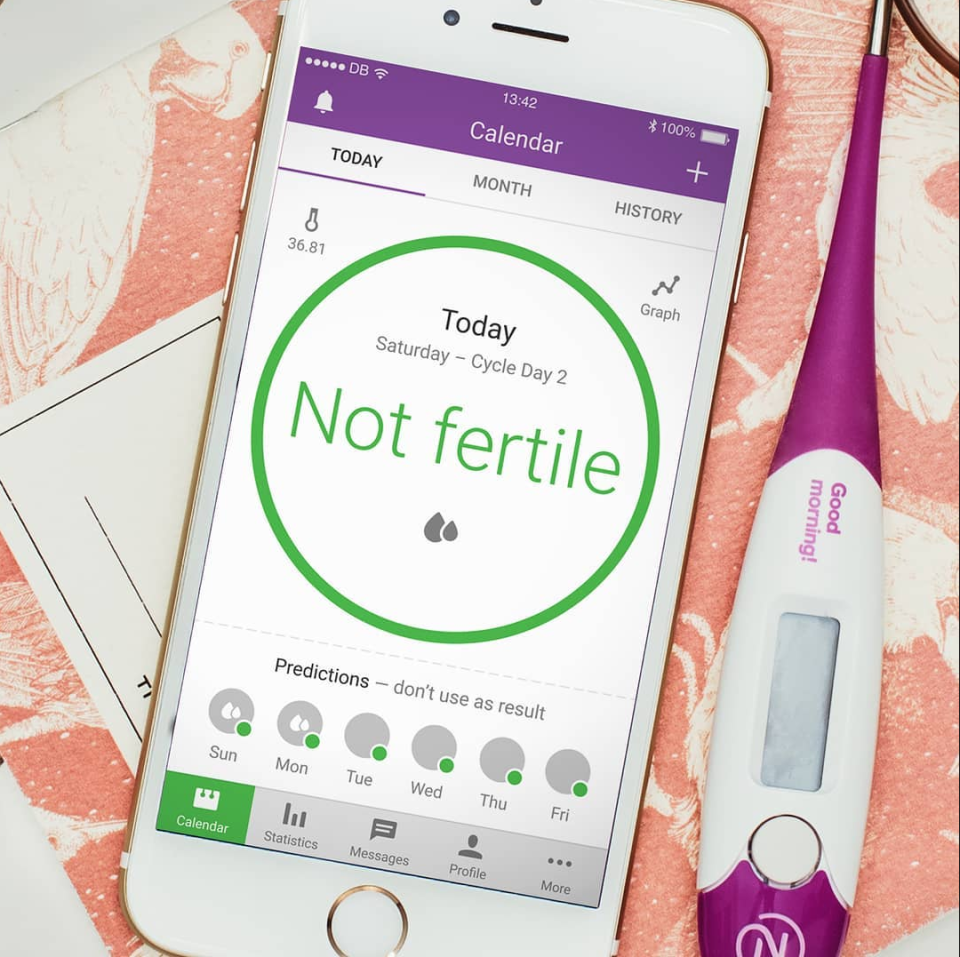What you need to know about Natural Cycles, the first FDA-approved pregnancy prevention app
There are a lot of options on the market when it comes to choosing a birth control method, and now there’s one more to add to the list: Natural Cycles, an app that claims it can help prevent pregnancy.
The Food and Drug Administration (FDA) has approved marketing for the app, which is the first of its kind to be used as a method of contraception, the agency announced in a press release. The app contains an algorithm that calculates the days of the month a woman is likely to be fertile based on her daily body temperature readings and the information she shares about her menstrual cycle.
Natural Cycles asks women to take their temperature daily first thing in the morning using a basal body thermometer and to enter the reading into the app. Basal body thermometers are more sensitive than regular thermometers and detect the minor rise in temperature that typically happens when a woman ovulates, the FDA says. The app actually helps prevent pregnancy by telling a user which days she should avoid having sex via “red” days (i.e., her most fertile times). Women are also advised by the app to “use protection” during this time. The app costs $79.99 per year and comes with a basal thermometer, according to the Natural Cycles website.

The FDA cites clinical studies involving 15,570 women who used the app for an average of eight months. With “perfect use,” the app failed 1.8 percent of the time; with “typical use,” the failure rate was 6.5 percent (the FDA chalks those up to not using the app correctly, like having unprotected sex on fertile days). Those numbers are actually better than those for hormonal birth control, which fails 9 percent of the time, according to data from the Centers for Disease Control and Prevention.
Natural Cycles made headlines earlier this year, when Swedish news agency SVT reported that 37 people in Sweden who sought an abortion at a large hospital in Stockholm between September and December 2017 had unintended pregnancies while using the app.
Overall, this concept isn’t exactly new — but the app part is, women’s health expert Jennifer Wider, MD, tells Yahoo Lifestyle. “The idea behind this is fertility awareness where a woman tracks the days she is most fertile based on her basal body temperature and the timing of a cycle,” she says. “It can very effective, as long as it’s used correctly.”
That’s a big “if” though. “Women do need to take caution that this is not 100 percent effective,” Jessica Shepherd, MD, a minimally invasive gynecologist, tells Yahoo Lifestyle. “It’s important to understand in order for it to work effectively, you have to make sure you’re looking all the information correctly and you can’t deviate from that.”
Lauren Streicher, MD, a professor of clinical obstetrics and gynecology at Northwestern University’s Feinberg School of Medicine, tells Yahoo Lifestyle that she’s not impressed. “What is this, the 1950s?” she says. “Instead of using real contraception for women that is proven to be safe and effective, this is essentially advocating an anti-contraception approach. To have the FDA endorse an app as being safe is just kind of mind-boggling.”
The app could potentially be helpful for women who know they want to try to conceive in the near future and would be OK with getting pregnant earlier than expected, Shepherd says. Ditto for women who are in their late 30s or early 40s, when fertility isn’t as high, and who don’t want to use other birth control methods — and, again, would be OK with an unintended pregnancy if it happened.
But women should be aware that there are much more effective methods available, like the implant (failure rate of 0.05 percent), hormonal IUD (failure rate of 0.2 percent), and copper IUD (0.8 percent), Streicher says. “Science has proven that non-user-dependent contraception is going to be the most effective,” she says. “This is the opposite end of the spectrum.”
Ultimately, birth control is an individual decision, Wider points out, but it’s a good idea to check in with your doctor about your options if you’re not sure which is right for you.
Read more from Yahoo Lifestyle:
Hijabis may be fashion’s latest darling, but 76% of Muslim-American women still feel judged
How Muslim style star Leah Vernon decided ‘to be myself, unapologetically’
Follow us on Instagram, Facebook, and Twitter for nonstop inspiration delivered fresh to your feed, every day.
